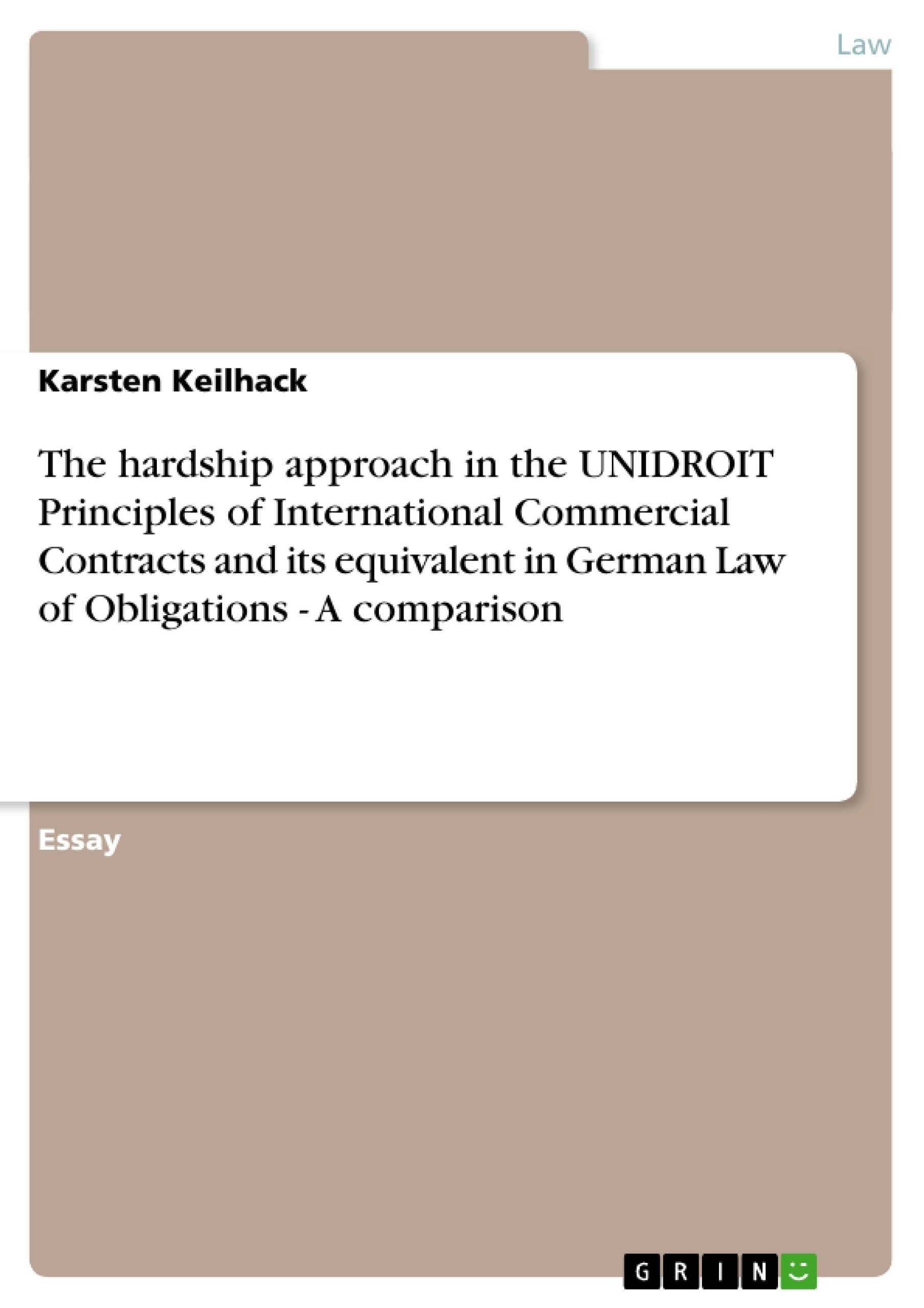The UNIDROIT Principles of International Commercial Contracts1 have been published in May 1994 by the Rome-based International Institute for the Unification of Private Law (UNIDROIT), an intergovernmental organisation established in 1926. The Working Group on the UNIDROIT Principles was found in 1980 and consisted of independent legal scholars of all major legal systems of the world. The UNIDROIT Principles are not binding law. Most legal writers agree that they can be characterised as a restatement of the law of international commercial contracts2 and despite the controversial issue about the very existence, scope and content of a lex mercatoria - the possibility of applying supranational law to international legal relationships- most authors agree that it exists and that the UNIDROIT Principles are a significant part of it3.
The object of this paper is to examine the UNIDROIT Principles’ approach to hardship laid down in Chapter 6, Section 2 and to compare it with its equivalent provision in the German Civil Code (Bürgerliches Gesetzbuch, hereinafter BGB), § 3134. For this purpose it is firstly necessary to define the term “hardship”. Thereafter I will consider the respective provisions in detail and highlight differences and similarities.
Inhaltsverzeichnis (Table of Contents)
- Introduction
- I. The UNIDROIT Principles
- A. The Hardship Approach in the UNIDROIT Principles
- B. Relevance and Acceptance of Hardship in International Commercial Law
- II. The Concept of Hardship in German Law: Interference with the Foundation of the Contract - Störung der Geschäftsgrundlage
- A. History and Development of the Hardship Doctrine in Germany
- B. The Hardship Doctrine in present German Civil Law -the BGB after the Reformation of the Law of Obligations in 2002
- III. Conclusion
Zielsetzung und Themenschwerpunkte (Objectives and Key Themes)
This paper aims to analyze the UNIDROIT Principles’ approach to hardship and compare it to the equivalent provision in the German Civil Code (BGB). It aims to define the term "hardship" and analyze the respective provisions in detail, highlighting differences and similarities.
- The concept of hardship in international commercial law
- The UNIDROIT Principles' approach to hardship
- The equivalent provision in the German Civil Code (BGB)
- The historical development of the hardship doctrine in Germany
- The relevance and acceptance of hardship in international commercial law
Zusammenfassung der Kapitel (Chapter Summaries)
- Introduction: This chapter introduces the UNIDROIT Principles and their significance in international commercial law. It also lays out the purpose and scope of the paper, focusing on the concept of hardship in the UNIDROIT Principles and the German Civil Code.
- I. The UNIDROIT Principles: This section examines the UNIDROIT Principles' approach to hardship, focusing on the relevant articles and their systematic position within the Principles. It also explores the relevance and acceptance of hardship in international commercial law.
- II. The Concept of Hardship in German Law: This section delves into the historical development of the hardship doctrine in Germany and its current application within the BGB. It examines how the concept of "Störung der Geschäftsgrundlage" (interference with the foundation of the contract) is applied in German law.
Schlüsselwörter (Keywords)
The key words and focus topics of this paper include: UNIDROIT Principles, hardship, international commercial law, German Civil Code (BGB), Störung der Geschäftsgrundlage, lex mercatoria, comparative contract law.
Frequently Asked Questions
What are the UNIDROIT Principles of International Commercial Contracts?
They are a restatement of international commercial contract law published by UNIDROIT, an intergovernmental organization, to help unify private law across different legal systems.
How is "hardship" defined in this legal context?
Hardship refers to situations where the occurrence of events fundamentally alters the equilibrium of the contract, making performance excessively burdensome for one party.
What is the German equivalent to the UNIDROIT hardship provision?
The German equivalent is found in § 313 of the German Civil Code (BGB), known as "Störung der Geschäftsgrundlage" (interference with the basis of the transaction).
Are the UNIDROIT Principles legally binding?
No, they are not binding law, but they are widely recognized as a significant part of the lex mercatoria (supranational commercial law).
What was the impact of the 2002 German Law of Obligations reform on hardship?
The reform codified the doctrine of "Störung der Geschäftsgrundlage" in § 313 BGB, providing a clearer statutory basis for dealing with contractual hardship in Germany.
- Arbeit zitieren
- Rechtsanwalt Karsten Keilhack (Autor:in), 2003, The hardship approach in the UNIDROIT Principles of International Commercial Contracts and its equivalent in German Law of Obligations - A comparison, München, GRIN Verlag, https://www.grin.com/document/22901



